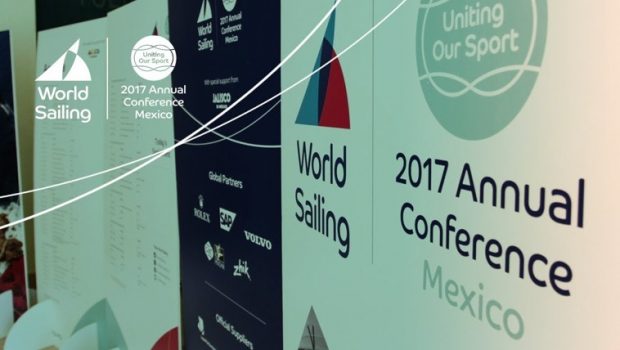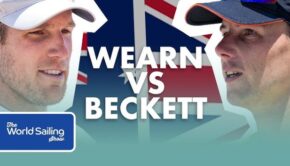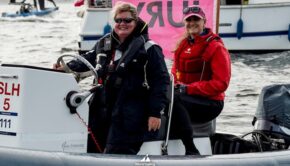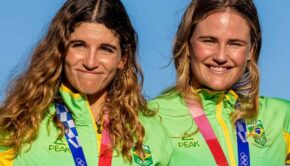World Sailing Conference Wraps Up
Published on November 13th, 2017
The 2017 World Sailing Annual Conference was held November 4-12 in Puerto Vallarta, México. More than 500 delegates, representing event organizers, class associations, Member National Authorities, key influencers and industry professionals, were in attendance.
Throughout the week delegates will reviewed the strategy of sport, discussed positive change and made decisions that impact professional and recreational sailors.
This year, the Conference was focused on an overarching theme of, ‘Uniting Our Sport’. Sailing’s stakeholders were working together to grow and develop the sport to ensure millions more people fall in love with sailing.
The Annual Conference included two open forums, a full agenda of Committee, Sub-Committee and Commission meetings as well as the meeting of World Sailing’s Council, the final decision making body of World Sailing.
At the end of the week, the Annual General Meeting (AGM) brought World Sailing’s Member National Authorities together to receive reports, review membership and ratify decisions made earlier in the Conference.
World Sailing’s Council made key decisions on November 10 and 11 ranging from the approval of an eSailing World Championships, an Offshore World Championships and Keelboat World Championships, through to approval of the format of the 2020 Olympic Sailing Competition.
Members at the AGM ratified the regulatory decisions of World Sailing’s Council and these will now be implemented, impacting sailors from the grassroots to the elite level of the sport.
Vice Presidents’ Reports
Nadine Stegenwalner opened the Vice-Presidential reports, giving an overview of the work done in training and development. In 2017, more than 16 Technical Courses for Coaches have been delivered and close to 500 coaches have gone through the courses.
Athletes’ Commission Chair Yann Rocherieux represents the interests of all the sailors. Roceherieux and the Commission have been focused on the event strategy and the steps forward as well as ensuring more work is done to make sailors heroes in the media.
Ana Sanchez outlined the development of Race Officials and how the first Expression Judges will be named soon. She also outlined the continued work within the Racing Rules Committee. In total, there are 22 working parties and 80 people working on the different aspects of the rules. Expertise is coming from other committees and incorporating others who are currently not involved in committees but can be in the future.
W. Scott Perry reported on the ongoing work in reinstating Para World Sailing back into the Paralympic Games Sports Programme. One of the key criteria for reinstatement back into the Paralympic Games is the number of participating nations and at the 2017 Worlds in Kiel, Germany, 78 sailors from 37 nations from five continents were represented.
Work continues to try and include Para World Sailing in other events, such as regional games and success came in 2017 with sailing in the European Para Youth Games.
Format, quotas and qualification for the Tokyo 2020 Olympic Games was the leading topic from Jan Dawson’s report. These would be voted on by Council on Saturday, November 11.
Gary Jobson gave an overview of the work done in the Oceanic and Offshore world. He referenced the continued work of the Universal Measurement System (UMS) and incident report.
Torben Grael gave insight into youth sailing, particularly the Buenos Aires 2018 Youth Olympic Games and the Youth Sailing World Championships and Quanhai Li concluded with a report into the development of sailing in Asia.
World Sailing’s Council approved the introduction of a Governance Commission. The Commission will undertake an in-depth and wide-ranging review of the governance structure of World Sailing. From there, they will make recommendations to the Board of Directors for modernizing World Sailing’s governance.
The Governance Commission will identify models of best practice from the IOC Basic Principles of Good Governance, the IOC Declaration on Good Governance, the work of the Association of Summer Olympic International Federations Governance Task Force (ASOIF) and governance reviews of other federations.
From there they will consider and recommend changes such as composition, powers, functions and procedures before reporting to the Board and Council in May 2018 with proposed changes. These will be presented in their final form to the Board in September 2018 and then put forward for consideration and review at the 2018 Annual Conference.
The creation of the Governance Commission is in line with World Sailing’s two-year governance modernization roadmap outlined in May 2016. World Sailing’s two-year road map focuses on meeting ASOIF’s standards.
Council Symposium
For the first time at a Council meeting, a symposium was held with guest speakers presenting on developments within the sport.
Tom Herbert Evans was the Community Manager at the 35th America’s Cup in Bermuda and provided delegates with insight into the Endeavour Program. The Program took sailing into schools through educational initiatives and allowed hundreds of new sailors to gain awareness and get involved in the sport.
Stan Honey delivered the innovative graphics and technology at the America’s Cup and he gave delegates an insight into the technology, how it works and how it’s being adapted to become more cost effective. Richard Slater, Chief Umpire at the 35th America’s Cup, carried on from Honey, explaining how the technology was used by the officials.
The technology was able to track the boats to within 2cm and enabled the umpires to increase the accuracy and consistency of decision making. It also helped to improve the sailor experience in terms of reviewing and coaching and improved race management.
Matthew Mason and his daughter Emma Mason concluded the presentations by providing a fascinating insight into a new development for the Optimist dinghy. Matthew designed a new bow that can attached onto the Optimist as well as an addition to the existing rig. The development would turn the boat into a two-person boat for young children as well as enabling heavier children to continue sailing in the boat.
Offshore World Championships introduced
World Sailing will hold an Offshore World Championship in the future. The Offshore Worlds will be held in One Design boats to help promote and raise the profile of Offshore Sailing, which represents a significant element of the sport.
Selection of equipment, dates and venue as well as arrangements of the Worlds will be decided by World Sailing’s Board of Directors in consultation with the Oceanic and Offshore Committee.
Para World Sailing representative to be included in Athletes’ Commission
Since its inception, World Sailing’s Athletes’ Commission was open only to sailors who had competed at an Olympic Sailing Competition. World Sailing’s Council approved the inclusion of a Para World Sailing representative into the Athletes’ Commission as many issues considered by the Commission affect Olympians and Paralympians.
Sailors who competed at the 2017 World Championships will be able to vote for a representative who competed at the worlds as well as the Rio 2016 Paralympic Games. In addition to the inclusion of an Athletes’ Commission representative, Council approved the equipment and formats for the 2018 Para World Sailing calendar.
To include athletes with high level disability, help grow participating nations and spectator / media appeal the following will be used in 2018:
• Single Person Keelboat (Technical) – Open Gender – 2.4 Norling OD – fleet racing with a Medal Race
• Single Person Keelboat (Non-Technical) – Male – Hansa 303 – Short course fleet racing, supplied boat with a Medal Race
• Single Person Keelboat (Non-Technical) – Female – Hansa 303 – Short course fleet racing, supplied boat with a Medal Race
• Two Person Keelboat – Open Gender – RS Venture Connect – Short course fleet racing, supplied boat with late stage knockouts. The winner of the final race will win the event
Other business
From 2022 onwards, the Para World Sailing Championships will be held alongside the Sailing World Championships.
Three new classes were approved to receive World Sailing Class Association status. The high flying GC32, the youth windsurfer Techno 293 Plus and the 50 foot yacht, ClubSwan 50 will join 114 other existing classes.
More than 40 of World Sailing’s Class Associations are One Design keelboats. With keelboat sailing widely representing the aspects of sailing a “Champion of Champions” event will be established. The event will welcome World Champions of all World Sailing Keelboat Classes to promote keelboat sailing worldwide and showcase a keelboat pathway from club racing, through to class championships and into the Champions of Champions event.
An Offshore Sailing World Championship will be introduced and will include the best results from the joint ORC/IRC Offshore World Championship as well as a separate long distance offshore component selected from existing major events.
The scoring system will be defined between RORC and ORC with prizes awarded to skippers and crews, not the boat, enabling chartering of boats.
Members of Judicial Review Board and the Ethics Commission were also approved.
Tokyo 2020 Olympic format and qualification
The racing format for the Tokyo 2020 Olympic Games was decided. The Men’s and Women’s 470, Finn, Laser and Laser Radial will all sail an opening series which will be followed by a double point Medal Race.
Men’s and Women’s RS:X sailors will also sail an opening series and a double point Medal Race, however when the wind conditions suit planing, they will have a reaching start and finish.
World Sailing’s Council had a discussion and debate on the 49er and 49erFX Medal Race format. The Events Committee proposed that three single point races on the final day shall be sailed with the use of boundaries at the discretion of the Race Committee.
Council voted against the proposal and the 49er and 49erFX fleets will now sail an opening series and a single double points Medal Race.
The Council also noted that the Nacra 17 format had not been fully tested but it’s expected they will retain their current opening series and a single double points Medal Race.
The qualification system for Tokyo 2020 was also approved by World Sailing’s Council. The Aarhus 2018 Sailing World Championships will be the principal qualification event. Places will be available at the 2018 Asian Games, 2019 Pan-Am Games and 2019 World Championships. Further places will be available at continental events.
The qualification system will now be reviewed by the International Olympic Committee (IOC) and all International Federation qualification systems will be approved by the IOC Executive Board in February 2018.
Events Reporting
World Sailing Director of Events, Alastair Fox, provided Council members will updates from World Sailing’s family of events and upcoming Olympic Games.
Fox highlighted how 62 nations have registered to race at the 2017 Youth Sailing World Championships in Sanya, China and strong progression is being made for the 2018 and 2019 editions. World Sailing continues to engage with MNAs and host cities on the 2020 and 2021 bidding process.
Many of the competitors sailing at the Youth Worlds go on to sail at World Championships in the senior events. The next Sailing World Championships will be held in Aarhus, Denmark in 2018. The organising authority are expecting close to 400,000 people to engage in the event in 2018 and preparations are on track.
Following the success of the 2017 Para World Sailing Championships, Fox reported outlined the priorities for Para World Sailing 2018. Priorities include preparing an application for reinstatement into the Paralympic Games Sports Programme, maintaining participation as well as developing events, partnerships and the Paralympic Development Programme.
Looking ahead to the Tokyo 2020 Olympic Games, Fox gave Council members an insight into the next steps for World Sailing and the organising committee which include deciding the field of play, developing the venue and procuring equipment. The 2018 World Cup Series Japan event in Enoshima will be used as a test event for the sailors and in 2019, a dedicated test event will be held.
The International Olympic Committee selected Paris as host of the 2024 edition and Los Angeles for 2028 and preparations have already commenced for the sailing competitions of both Games.
The Bermudan Tourism Authority put forward a bid for Bermuda to host the 2019 edition of the World Sailing Annual Conference. Following a vote by the members, this was approved.
The next meetings of World Sailing will be held from 12-15 May 2018 in London, Great Britain. Sarasota, USA will host the Annual Conference from 27 October to 4 November 2018.
Source: World Sailing









 We’ll keep your information safe.
We’ll keep your information safe.